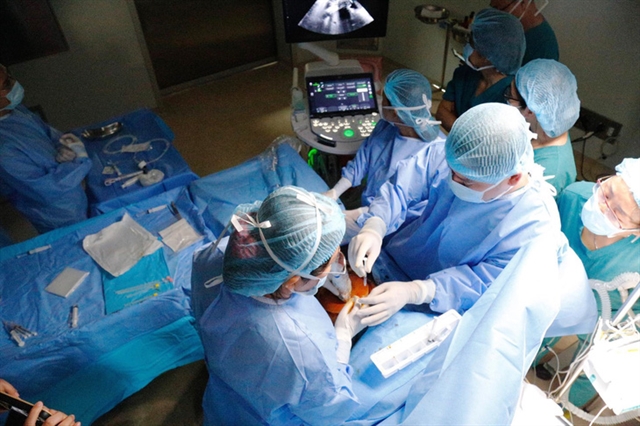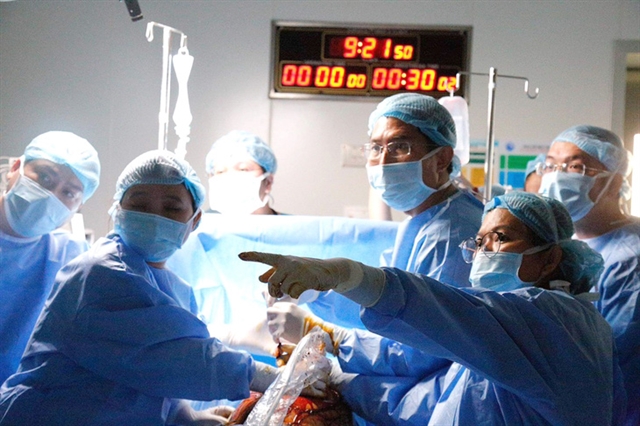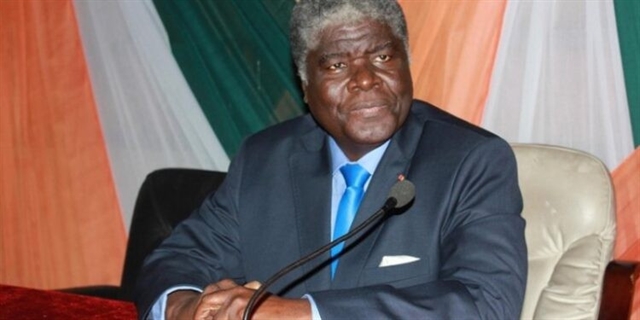 Society
Society

 |
| A foetal cardiac intervention was successfully performed by doctors from Từ Dũ Hospital and Children’s Hospital 1 in HCM City, the first ever in Southeast Asia. — Photo from Từ Dũ Hospital |
HCM CITY – Doctors from Từ Dũ Hospital and Children’s Hospital 1 in HCM City successfully performed a foetal cardiac surgery on January 4, the first ever not just in Việt Nam but in Southeast Asia.
It was done to unclog the foetus's heart valve through the mother’s womb.
In early November, in the 26th week of pregnancy, the baby was diagnosed with a severe congenital heart defect: it had hypoplastic right heart syndrome (HRHS) and a minuscule pulmonary valve opening.
In HRHS, the structures of the right side of the heart are underdeveloped, causing inadequate blood flow to the lungs and thus a lack of oxygen.
The mother, L. (26) of Đà Nẵng City, was transferred from Đà Nẵng Hospital to Từ Dũ Hospital for further prognostications.
The condition kept worsening and eventually threatened to become fatal before the final consultation scheduled on January 3.
Normally, if an intervention to open the pulmonary valve is not done, there would be a miscarriage.
Neonatal death would also occur if, instead, the mother is forced to deliver due to preterm birth and the infant’s serious heart disease, experts from both hospitals said during the final consultation.
But in this case, the doctors warned of a likely stillbirth if no intervention was done, or the baby being born alive but with cardiac defects and requiring difficult surgeries.
“In the case of cardiac surgeries, foetal intervention has a higher success rate than surgeries done on newborns since the foetus’s valve will be able to heal naturally with the help of stem cells, leaving no scars behind,” director of Từ Dũ Hospital, Dr Trần Ngọc Hải, said.
The surgery was then done in week 32 of the pregnancy, Đỗ Nguyên Tín, deputy head of the cardiac department at Children’s Hospital 1, told Tuổi Trẻ (Youth) newspaper.
Surgeons from the two hospitals were divided into one groups each for anaesthesia, foetal intervention, cardiac angioplasty, neonatal resuscitation, and delivery.
A surgical needle was used to penetrate the mother’s uterus wall and reach through the amniotic sac to the right side of the foetus's heart.
“Foetal cardiac intervention is the most complex process,” Hải said.
“It requires absolute precision to anaesthetise a foetus.”
The child’s heart was the size of a lime, with only 2-3 sq.cm for each cardiac chamber and 4 millimetres for the pulmonary valve opening, making the surgery harder and more demanding.
But the skill of the personnel and the use of high-quality surgical equipment meant the 40-minute surgery was a success.
“It was also the mother’s courage and trust that empowered us,” Trịnh Nhựt Thư Hương, head of the prenatal care department at Từ Dũ Hospital, said.
Foetal cardiac unclogging has only been around for only five years, with just a few countries like Brazil and Poland succeeding at it.
Tín is hopeful the success would help further foster children’s heart valve surgery in Việt Nam.
 |
| The surgery is a new advancement that brings Vietnamese healthcare sector on a par with its counterparts in developed countries. Photo from Từ Dũ Hospital |
Deputy director of the city Department of Health, Nguyễn Anh Dũng, said the surgery shows the efforts made to innovate technological solutions in healthcare.
Vice chairman of the city People’s Committee, Dương Anh Đức, said it is also a new advancement that takes the city’s medical sector on a par with their counterparts in developed countries.
“There has been no abnormality since the surgery, and both the mother and the child are in great condition with free post-surgery care.
“They are expected to be discharged on January 8.”
The mother, L., said: “I am beyond happy; it is as if my child is reborn. Nothing can express my gratitude to all the doctors.”
Assoc Prof Nguyễn Hoài Nam said congenital heart defects are common in infants, which diminish their health, and their treatment is financially demanding.
Each year around ten to 12,000 Vietnamese children are diagnosed with congenital cardiac defects, meaning one such child is born every 15 minutes.
Around 50 per cent are in severe condition, and 5,000 get to receive cardiac surgeries. – VNS




